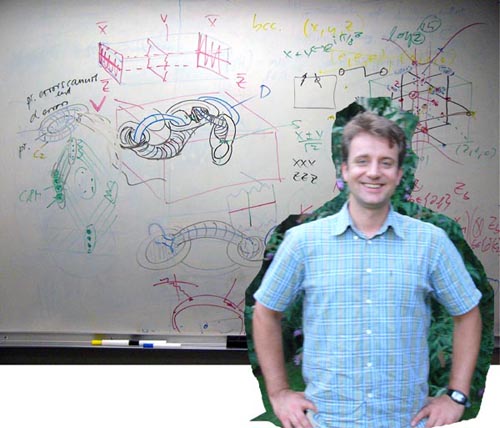Research
My research interest is in quantum computation, in
particular
computational models. One object of study in this field is the
one-way quantum computer, a scheme of quantum computation
consisting of local measurements on an entangled universal resource
state. The questions I ask are ``What are the elementary building
blocks of the one-way quantum computer? What is their composition
principle?'' I hope that the answer to these questions will give clues
for how to construct novel quantum algorithms. Another model of
quantum computation that I study are
quantum cellular automata (QCA). I am, for example, interested in the
question of whether and what type of quantum algorithms can be encoded
the shape of the boundary of a finitely extended quantum cellular
automaton.
I have invented the one-way quantum computer (QCc)
together with Hans Briegel (UK patent GB 2382892, US patent 7,277,872).
The QCc is a scheme of universal quantum
computation by local measurements on a multi-particle entangled
quantum state, the so-called cluster state. Quantum
information is written into the cluster state, processed and read
out by one-qubit measurements only. As the computation proceeds, the
entanglement in the resource cluster state is progressively
destroyed. Measurements replace unitary evolution as the elementary
process driving a quantum computation.
I also work in the field of fault-tolerant quantum
computation. Error-correction is what a large-scale quantum computer
spends most of its computation time with, and it is important to
devise error-correction methods which allow for a high error threshold
at a moderate operational overhead. My research interest is in
fault-tolerance for quantum systems with a geometrical constraint,
e.g. low-dimensional lattice systems, and in topological methods.
Selected publications
R. Raussendorf and J. Harrington, Fault-tolerant quantum
computation with high threshold in two dimensions,
arXiv:quant-ph/0610082,
Phys. Rev. Lett. 98, 150504 (2007).
R. Raussendorf, J. Harrington, K. Goyal
A fault-tolerant one-way quantum computer, arXiv:quant-ph/0510135,
Ann. Phys. (N.Y.) 321, 2242 (2006).
R. Raussendorf, S. Bravyi, J. Harrington,
Long-range quantum entanglement in noisy cluster
states, arXiv:quant-ph/0407255
,
Phys. Rev. A 71, 062313 (2005).
R. Raussendorf and H.-J. Briegel, Computational model
underlying the one-way quantum computer, arXiv:quant-ph/0108067,
Quant. Inf. Comp.
6, 443 (2002).
R. Raussendorf and H.-J. Briegel, A one-way quantum
computer, (preprint version is
entitled ``Quantum computing via measurements only'', arXiv:quant-ph/0010033),
Phys. Rev. Lett. 86, 5188 (2001).
H.-J. Briegel and R. Raussendorf, Persistent Entanglement in
Arrays of Interacting Particles , arXiv:quant-ph/0004051,
Phys. Rev. Lett. 86,
910 (2001).
A complete list of my publications can be found here.
Brief academic bio
I received my Diploma/Master degree in Physics
from the Ruprecht Karls University in Heidelberg, Germany in
1997. My thesis Diploma thesis is on ``A Linear Sigma-Model for Vector
and Axial Vector Mesons'' (low-energy quantum
chromodynamics). In 1998/99 I did community service at
the German Cancer
Research Center Heidelberg. In 2003 I obtained my PhD from the Ludwig
Maximilians University in Munich, Germany (summa cum laude). My PhD
thesis is on measurement-based
quantum computation. From 2003
to 2006 I was postdoc at Caltech and I am presently postdoc at the
Perimeter Institute for Theoretical Physics in Waterloo, Canada. I
will join the Physics and Astronomy department at the University of British
Columbia as Assistant Professor in January 2008.
Top of page
